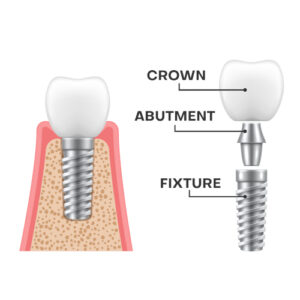FAQs
Dental Implant FAQs in Memphis
Dental implants have revolutionized modern dentistry by providing a long-lasting, natural-looking solution to missing teeth. At Periodontal Associates of Memphis, we know that patients have numerous questions about the implant process—how it works, its benefits, and what to expect during recovery. Below, we answer frequently asked questions and delve deeper into why dental implants remain one of the best investments you can make for your oral health and overall well-being.
Understanding Dental Implants

A dental implant is a small titanium post that acts as an artificial tooth root, replacing the root portion of a missing tooth. When placed into the jawbone, this post fuses with the surrounding bone tissue through a biological process known as osseointegration. This bond creates a sturdy foundation on which a crown, bridge, or denture can be attached.
Unlike traditional dentures or bridges that rest on top of the gums or rely on adjacent teeth for support, dental implants function just like natural teeth. Each implant has three main components:
- Implant post (fixture) – The titanium screw that’s surgically placed into the jawbone.
- Abutment – A small connecting piece attached to the implant post.
- Crown, bridge, or denture – The prosthetic tooth or teeth that sit atop the abutment.
This design allows the implant to mimic both the appearance and functionality of a natural tooth, helping you chew, speak, and smile with confidence.
Who Is a Good Candidate for Dental Implants?

Most adults missing one or more teeth can be great candidates for dental implant treatment, but a comprehensive evaluation is crucial. Factors that determine candidacy include:
- Healthy Gums and Bone Density: Adequate jawbone volume is necessary for stable implant placement. If bone loss is present, procedures like bone grafting can rebuild the area to support an implant.
- Overall Health: Certain medical conditions (e.g., uncontrolled diabetes) or lifestyle habits such as smoking can affect healing and bone integration. While these factors may not completely rule out implants, they do require careful consideration and management.
- Oral Hygiene Routines: Good oral hygiene is essential for preventing infections around the implant site. Patients who commit to regular brushing, flossing, and dental check-ups generally experience higher long-term success rates.
- Commitment to Follow-Up Care: Achieving and maintaining healthy implants requires ongoing professional cleanings and evaluations.
During your consultation at Periodontal Associates of Memphis, our periodontists will examine your jaw structure, discuss your health history, and create a personalized treatment plan. Even if you’ve been told in the past that you lack adequate bone for implants, modern techniques and materials often make it possible to proceed safely.
Main Benefits of Dental Implants
Here are some of the primary advantages that make dental implants the gold standard for replacing missing teeth:
1. Natural Look and Feel
One of the biggest advantages of dental implants is their realistic appearance. Because they fuse with your jawbone, implants look, feel, and function like your natural teeth. This level of authenticity is particularly appealing to those who wish to smile, speak, and eat without concern for shifting dentures or visible clasps.
2. Longevity and Durability
When properly cared for, dental implants can last a lifetime. They are made from titanium—a biocompatible metal known for its strength and corrosion resistance. Unlike traditional bridges that may need replacing every 10–15 years, implants have the potential to stand the test of time.
3. Bone Preservation
The presence of tooth roots in the jawbone stimulates healthy bone growth. When a tooth is lost, the surrounding bone begins to deteriorate. By replacing both the tooth crown and root, implants help preserve jawbone density, preventing the sunken facial appearance that can occur with missing teeth.
4. Enhanced Confidence and Comfort
Because they’re fixed in place, implants eliminate many of the challenges associated with removable dentures—such as slipping, clicking, or the need for messy adhesives. Restoring a complete smile can dramatically improve self-esteem and overall quality of life.
The Dental Implant Process: Timeline and Steps
The journey to a fully restored smile typically involves multiple stages:
1. Initial Consultation and Planning
Your periodontist conducts a thorough examination, which may include X-rays or 3D imaging to assess bone quality and map out the optimal placement for your implant.
2. Implant Placement Surgery
During this procedure, the titanium implant post is carefully inserted into the jawbone. This process usually takes 1–2 hours depending on how many implants are being placed. Local anesthesia is used to keep you comfortable.
3. Osseointegration (Healing Period)
Over the next few weeks to several months, the implant fuses with your jawbone. This phase is critical for long-term stability. Most patients can resume daily activities a day or two after surgery, but must follow specific aftercare instructions to ensure proper healing.
4. Abutment and Crown Placement
Once the implant has successfully integrated and your gum tissue has healed, a small connector piece called an abutment is secured to the implant. A custom-made crown or other prosthetic is then attached to complete your new tooth.
All-on-4 Dental Implants: An Overview
For patients who need to replace an entire arch of teeth, All-on-4 provides a streamlined solution. Instead of placing an individual implant for each missing tooth, this procedure uses four strategically positioned implants to secure a full arch restoration.
Key Benefits of All-on-4
- Fewer Implants Needed: Using only four implants helps reduce cost and surgery time.
- Immediate Function in Some Cases: Many patients can receive a temporary arch on the same day as implant placement, allowing them to leave the office with a functional smile.
- Bone Grafting Reduction: The angled placement of the implants can often bypass areas of low bone density, reducing or even eliminating the need for bone grafts.
All-on-4 is especially beneficial for those with significant tooth loss or who’ve struggled with loose dentures. After the healing period, a final, permanent prosthetic is attached, delivering a secure, natural-feeling set of teeth that can last for many years with proper care.
Frequently Asked Questions
Below you’ll find more answers to some of the most common questions our patients ask about dental implants. If you don’t see your question here, feel free to reach out. Our team is always happy to help you feel informed and confident in your care.
Is the Procedure Painful?
A common concern for patients is the level of discomfort during and after implant surgery. In most cases, the procedure itself is minimally painful because local anesthesia thoroughly numbs the treatment area. Some patients may opt for additional sedation to ease anxiety. After the surgery, it’s normal to experience mild swelling or soreness in the gums and jaw, much like having a tooth extraction.
Over-the-counter pain relievers typically suffice for managing post-operative discomfort. However, if you have concerns about pain tolerance or healing, discuss these with your periodontist. They can recommend prescription medications or additional measures to ensure your comfort. Following proper post-operative instructions, such as using an ice pack and eating soft foods, also promotes smooth recovery.
How Much Do Dental Implants Cost?
The cost of dental implants can vary widely, and several factors influence the final price:
- Number of Implants Needed: Replacing a single tooth is typically less costly than replacing multiple teeth or a full arch.
- Additional Procedures: If you require a bone graft, sinus lift, or gum graft, these will add to the total expense.
- Type of Prosthetic: A single crown has a different price point than an implant-supported bridge or full denture.
- Geographic Location and Practice Expertise: Costs can vary by region and the experience level of your periodontist.
While dental insurance may not fully cover implants, many providers offer partial coverage or allowances equivalent to more traditional treatments (like bridges). It’s worth contacting your insurer to determine potential benefits. At Periodontal Associates of Memphis, we strive to make implant dentistry accessible, offering guidance on flexible payment plans or third-party financing. Although the initial investment can be higher than other tooth-replacement options, the long-term value often surpasses alternatives due to the implants’ longevity, bone-preserving qualities, and overall impact on your quality of life.
Are Dental Implants Removable?
Dental implants are designed to be permanent. Once placed, the implant post fuses with your jawbone, providing a stable foundation for the attached restoration. This differs from traditional dentures, which rest on top of the gums and can be taken out daily for cleaning.
Because implants integrate with the bone, you don’t remove them for cleaning or sleeping. Instead, you brush and floss around them just as you would natural teeth. For certain implant-supported denture systems, the prosthetic can be removable for maintenance, but the implants themselves remain firmly fixed in the jaw. This permanence yields superior comfort, confidence, and longevity compared to removable options.
How Do I Care for My Dental Implants?
Caring for dental implants is straightforward, though proper oral hygiene remains crucial to ensure their longevity. Here are some guidelines:
- Daily Brushing and Flossing: Continue to brush at least twice a day using a soft-bristled toothbrush. Floss at least once daily, paying extra attention to the areas around the implant. Specialized floss or interdental brushes can help clean under the prosthetic where standard brushing may not reach.
- Routine Dental Check-Ups: Professional exams and cleanings are essential. Your dentist or hygienist can monitor the implant site for any signs of inflammation or periodontal disease.
- Healthy Lifestyle Habits: If you smoke or use tobacco, consider quitting. Smoking can hinder healing and increase the risk of implant failure. A balanced diet rich in vitamins and minerals also supports gum health.
- Avoid Hard or Sticky Foods (Initially): During your initial healing, steer clear of extremely hard or sticky foods that may disrupt the implant site or crown. Once fully integrated, you should be able to enjoy most of your favorite foods without limitation.
Can I Still Get Implants If I Wear Dentures?
Yes. Many patients who currently use full or partial dentures opt to upgrade to implant-supported dentures for a more stable solution. Traditional dentures can sometimes slip or cause irritation to the gums, especially if they’re ill-fitting over time. In contrast, implant-supported dentures anchor securely to your jaw, preventing movement when you speak or chew.
In most cases, you’ll need a new denture designed to fit around the implants. This ensures the prosthesis aligns properly for a comfortable and functional bite. Some patients also choose All-on-4 implants instead of conventional dentures to replace an entire arch of teeth. Consulting with an experienced periodontist will help you determine if implant-supported dentures or another implant solution best meets your oral health needs.
How Successful Are Dental Implants?
Dental implants boast a high success rate, commonly reported between 90–95%. Several factors contribute to this impressive statistic:
- Good Oral Hygiene: Patients who maintain consistent brushing, flossing, and professional cleanings typically fare best.
- Overall Health and Lifestyle: Certain systemic conditions (e.g., uncontrolled diabetes) or smoking can slow healing and affect implant stability.
- Quality of Bone: Adequate jawbone density supports successful osseointegration. Additional treatments like bone grafting can help increase bone volume, boosting success rates.
- Expert Placement and Planning: Working with a skilled periodontist experienced in implant procedures greatly reduces potential complications.
While most implants last for decades, regular monitoring is vital. During routine check-ups, your dentist will assess the surrounding bone, gums, and overall condition of the restoration to ensure everything remains healthy.
Schedule Your Dental Implant Consultation
Missing teeth can impact every aspect of your life—from your bite and speech to your self-esteem. With the advanced implant treatments available at Periodontal Associates of Memphis, you don’t have to settle for temporary fixes. Our team of experienced periodontists is dedicated to delivering a comfortable, personalized experience that meets your unique oral health needs.
If you’re ready to regain a confident smile and the freedom to enjoy your favorite foods, consider exploring dental implants. We welcome you to reach out for an in-depth evaluation and personalized treatment plan. Dental implants may not be right for everyone, but for many, they represent a life-changing investment in both oral health and overall well-being—one that can last a lifetime.
MEET YOUR MEMPHIS DENTAL IMPLANT EXPERTS
Dr. Godat, Dr. King & Dr. Byakina
Our team is dedicated to providing a personalized approach to each patient’s dental implant journey. From the initial consultation to post-surgery follow-up, we’ll guide you every step of the way, ensuring that your experience is as comfortable and successful as possible.


